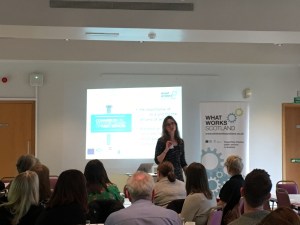What works in place-based approaches to improving outcomes for children and young people?
The presentations and discussions examined the potential offered by working collaboratively to reduce childhood poverty at a neighbourhood level.
The attendees also explored how evidence can support change and the best way to collect and present that evidence.
Pupils from Sacred Heart Primary School, one of two local schools playing a major role in the Bridgeton and Dalmarnock Children’s Neighbourhood also came to talk to attendees. The CNScotland researchers Sarah Ward and Maureen McBride explained that the children will carry out the next stage of research by doing a survey of their peers, and Sarah and Maureen will help them analyse the data they have collected.
The seminar drew on findings from two What Works centres – What Works Scotland and the Wales Centre for Public Policy.

The programme included presentations from across the UK including:
- Children’s Neighbourhoods Scotland
- Colin Early Intervention Community, Belfast
- Shankhill Children’s and Young People Zone, Belfast
- Welsh Pioneer programme
- Children’s communities and children’s zones in England
- University of Manchester, Manchester Institute of Education
- Sheffield Hallam University, Centre for Regional Economic and Social Research
Presentations
Download the presentations:
Place-based approaches to tackling poverty – lessons from the What Works centres
- Dr Claire Bynner, What Works Scotland and Children’s Neighbourhoods Scotland
- Dan Bristow, Public Policy Institute for Wales
Using evidence to inform policy and practice
- Sarah Melkevik, Children First, Wales and Lindsey Watkins, Head teacher, Millbrook Primary School
- Clare McGeady, Colin Early Intervention Community, Belfast
- Victoria Hirst, University of Manchester
- Sarah Ward and Maureen McBride, Children’s Neighbourhoods Scotland
Evidencing change
Jackie Redpath, from Shankill Children and Young People’s Zone in Belfast, showed this video which was produced as part of the project to help counter dominant narratives about the area.
Tweets from the event
Important focus on centring the voices of children and young people in decisions that concern them from @mmcbride84 @sward2205 @CnScotland #participation #Children pic.twitter.com/UKlvWz6LMy
— amanda ptolomey (@amandasays) April 30, 2019
@jackieredpath Look at the cause of the cause of the causes. Inspiring work in Belfast @CnScotland pic.twitter.com/pJHOJRtsXi
— Mrs Lindsey Watkins (@LindsWatkins) April 30, 2019
That’s a wrap! Had a great time hearing about everyone’s experiences with place-based, child-centred initiatives. So thankful for the opportunity to watch everyone share their challenges & successes with each other, & find new ways to improve children’s outcomes. pic.twitter.com/BBZchrS2iZ
— Madilyn (@MadilynCancro) April 30, 2019
The seminar was held at the St Mungo Museum of Religious Life and Art on 30 April 2019.


1 thought on “Improving outcomes for children and young people: using research and evidence to make change happen”